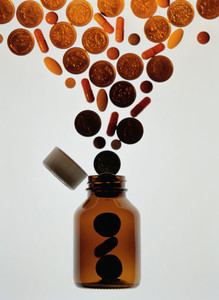A report released by the Council of Economic Advisers (CEA), an executive office of the President of the US, in February 2018 outlines a number of policy changes aimed at lowering drug prices, but some experts are sceptical that the actions will accomplish that goal.
The 30-page document, entitled ‘Reforming Biopharmaceutical Pricing at Home and Abroad’, states two goals:
1. Domestic drug prices paid by Americans should be reduced
2. The price of better health in the future should also be reduced by spurring medical innovation
The authors recognize that many artificially high prices result from government policies that prevent, rather than foster, healthy price competition. The report therefore suggests changes to the Medicare and Medicaid programmes that could help lower domestic prices, as well as reforms to the US Food and Drug Administration that could encourage more robust price competition. The CEA also proposes making some generics free for Medicare members.
Another proposal by the CEA is for payers to share the savings from drug rebates more directly with patients, an issue that has been a major source of tension between the pharmaceutical industry and insurers. Payers argue that they take the savings from rebates and apply them across the board to reduce premiums, but patient co-payments are determined by a drug’s list price, not the price after insurer rebates.
Another problem is that although global financial returns from product development drive innovation returns are unfairly low today. This, says the CEA, is caused by foreign governments forcing drugmakers to comply with pricing rules to gain market access. This, say the authors, means that Americans pay more than 70% of patented biopharmaceutical profits. They conclude therefore that pharmaceutical innovators—and foreign governments—across the world rely on America’s patients and taxpayers to finance critical research and development.
However, sceptics have said that these steps would not do much to accomplish the goal of reducing drug prices. the Pharmaceutical Care Management Association, which represents pharmacy benefit managers, said that the proposal to require Medicare Part D plans to use rebate savings to lower out-of-pocket costs instead of premiums and other expenses, ‘runs contrary to the Administration’s goal to reduce drug costs’. In fact, they add that ‘it would raise premiums for all seniors, help only 10% who take certain drugs, and do nothing to improve things for low-income seniors, who already pay no cost sharing in Part D’.
While Peter Maybarduk, Director, Public Citizen’s Access to Medicines Program, said that any ‘savings are very small compared to what would be possible if the White House stood up to prescription corporations’. He goes on to say that ‘instead of the half measures announced so far, the Trump administration should leverage government negotiating power, stop annual spikes and curb monopoly abuse.
In the US presidential electoral campaign, both Democrats and Republicans promised to pressurize large pharmaceutical companies to reduce prices of brand-name medicines [1]. However, Peter Maybarduk says the Trump proposal ‘refuses to take measures to curtail pharma’s pricing abuses and refuses to take on the monopolies that undergird the industry’s marketing power’.
Related articles
Mergers could be causing price increases for generics
Generics prices increase when competition decreases
Reference
1. GaBI Online - Generics and Biosimilars Initiative. Prices of brand-name drugs in the US have doubled since 2011 [www.gabionline.net]. Mol, Belgium: Pro Pharma Communications International; [cited 2018 Mar 2]. Available from: www.gabionline.net/Reports/Prices-of-brand-name-drugs-in-the-US-have-doubled-since-2011
Permission granted to reproduce for personal and non-commercial use only. All other reproduction, copy or reprinting of all or part of any ‘Content’ found on this website is strictly prohibited without the prior consent of the publisher. Contact the publisher to obtain permission before redistributing.
Copyright – Unless otherwise stated all contents of this website are © 2018 Pro Pharma Communications International. All Rights Reserved.
Source: CEA, PCMA, Public Citizen








 0
0











Post your comment